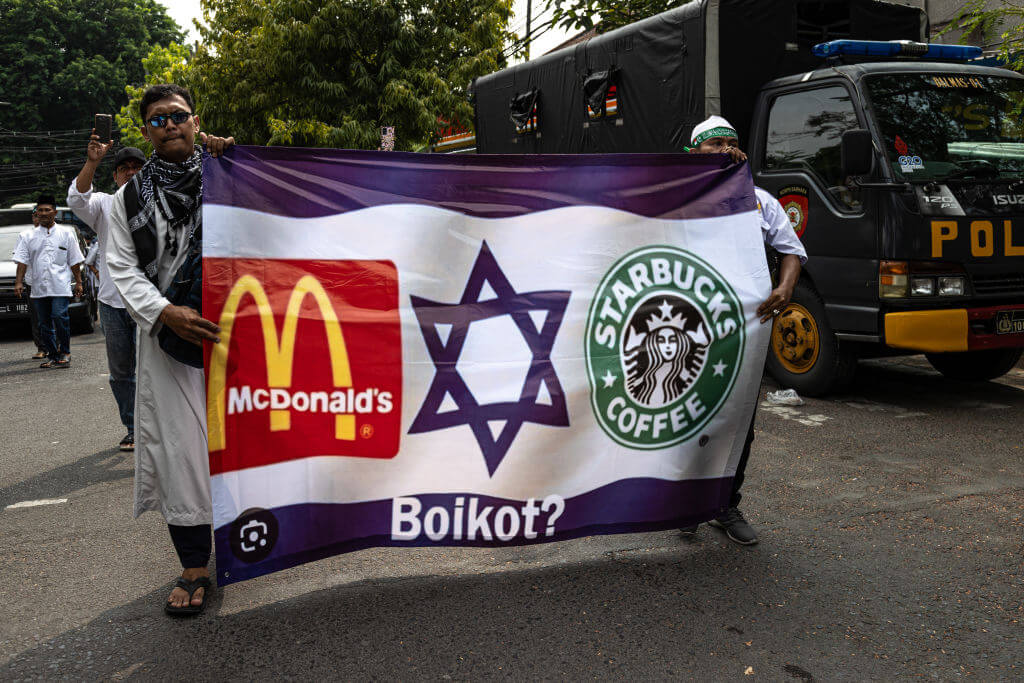How the war in Gaza hurt McDonald’s sales
A McDonald’s franchise donated meals to soldiers in Israel. That led to a boycott in the Arab world

Protesters demand boycotts of McDonald’s, Starbucks and other Western brands in Surabaya, Indonesia, Oct. 17. Photo by Robertus Pudyanto/Getty Images
McDonald’s latest earnings report shows that the war in Gaza is hurting its bottom line.
The company blamed lower-than-expected revenue, reported Monday in fourth-quarter earnings reports, on the Israel-Hamas conflict. The drop in sales is apparently tied to a McDonald’s franchise in Israel donating meals to Israeli soldiers, which has sparked outrage in the Arab world and a movement to boycott McDonald’s.
McDonald’s Israel announced the donation to feed the military on the social media platform X, in Hebrew, just days after Hamas’ Oct. 7 terror attacks in Israel.
The Israeli franchise of the fast-food giant, licensed to Alonyal Ltd. and owned by businessman Omri Padan, said it had donated 100,000 meals to Israeli soldiers, aid workers and Israelis who live near the Gaza border. It also announced a 50% discount for Israeli soldiers and other uniformed service workers at McDonald’s in Israel, and subsequently pledged to donate another 4,000 meals daily.
The bottom line: Decreased sales
This week’s earnings report showed a slowdown in McDonald’s sales in Arab countries in the Middle East, as well as in predominantly Muslim Asian countries like Malaysia and Indonesia. Sales were also down in France, home to a large Muslim population.
Overall, McDonald’s same-store sales rose 3.4% October-December, lower than the expected 4.7% increase. But same-store sales in its international developmental licensed markets segment only rose 0.7%, hurt by those weak sales in the Muslim world. In contrast, U.S. same-store sales rose 4.3%. (Same-store sales compare revenue from existing stores with revenue from those same stores in the past, excluding sales from newly opened stores or defunct stores for which there is no comparative data over time.)
In a regulatory filing, the company said it expected to experience a “negative impact on systemwide sales and revenue as long as the war continues.”
“Our outlook is, so long as this conflict, this war is going on, we’re not making any plans, we’re not expecting to see any significant improvement in this,” McDonald’s CEO Chris Kempczinski told investors in an earnings call Monday. “It’s a human tragedy what’s going on, and I think that that does weigh on brands like ours.”
Starbucks has also been impacted by boycotts related to a labor dispute and perceptions that it supports Israel.
How the franchise system works
McDonald’s licenses franchises around the world to open restaurants using its trademarks and menus. But those operators can run their businesses independently from the flagship brand and may tweak offerings for local markets. For example, a third of the more than 200 McDonald’s restaurants in Israel are kosher: They don’t serve cheeseburgers and they’re closed on Shabbat and Jewish holidays.
“In every country where we operate, including in Muslim countries, McDonald’s is proudly represented by local owner operators who work tirelessly to serve and support their communities while employing thousands of their fellow citizens,” Kempczinski said in January on LinkedIn, adding that “associated misinformation” related to the war was “affecting brands like McDonald’s. This is disheartening and ill-founded.”
McDonald’s in Muslim countries push back
McDonald’s franchises in Arab countries have tried to set themselves apart from the Israeli franchise with public statements supporting Palestinians in Gaza. Israel’s war there has killed thousands of people, razed large portions of the territory and, according to relief workers, put the population at risk of famine.
McDonald’s Oman, for example, announced $100,000 in aid to Gaza, and said on X that what “the licensee in Israel did was an individual and private act, and not with the approval or direction of the international company or any other licensee, especially in the Arab world.”
Meanwhile, McDonald’s Malaysia has sued Malaysia’s Boycott, Divestment & Sanctions for promoting the boycott of McDonald’s, saying BDS anti-Israel boycotts involve “false and defamatory statements” that have hurt its business. BDS Malaysia denied the accusation, and called on the McDonald’s parent company to terminate its agreement with McDonald’s Israel.
A message from our Publisher & CEO Rachel Fishman Feddersen

I hope you appreciated this article. Before you go, I’d like to ask you to please support the Forward’s award-winning, nonprofit journalism so that we can be prepared for whatever news 2025 brings.
At a time when other newsrooms are closing or cutting back, the Forward has removed its paywall and invested additional resources to report on the ground from Israel and around the U.S. on the impact of the war, rising antisemitism and polarized discourse.
Readers like you make it all possible. Support our work by becoming a Forward Member and connect with our journalism and your community.
— Rachel Fishman Feddersen, Publisher and CEO

























